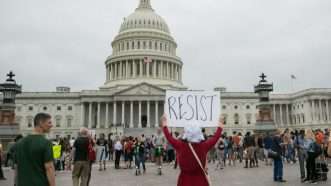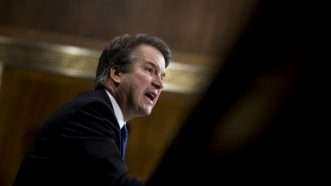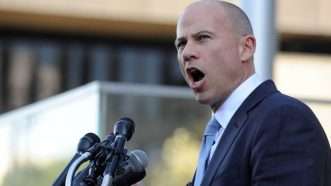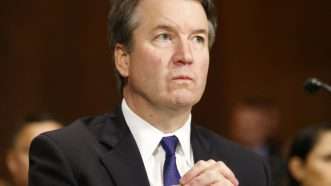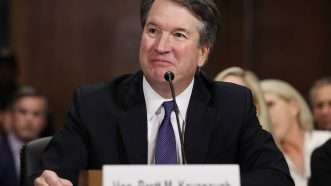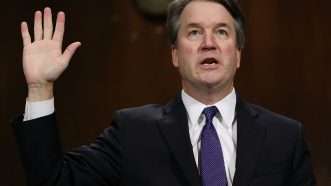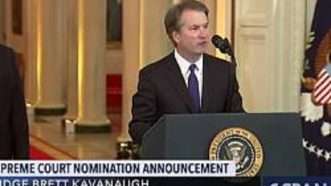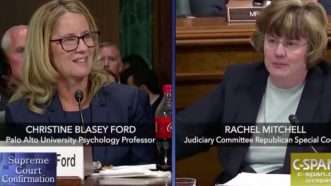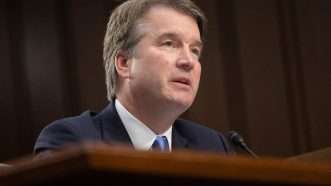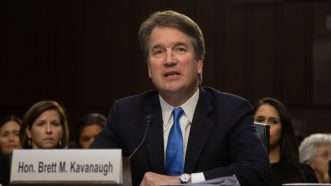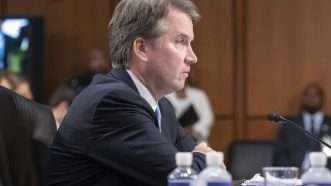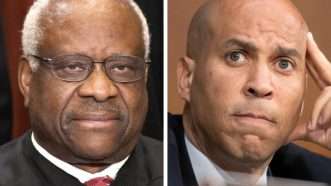Supreme Court
Gorsuch and Sotomayor Fault Congress for Giving 'a Blank Check to the Attorney General'
SCOTUS weighs congressional power, criminal law, and the non-delegation doctrine in Gundy v. U.S.
Alexandria Ocasio-Cortez: 'Eliminate' Electoral College, It 'Undermines' Democracy
The socialist candidate fails to grapple with why we have the Electoral College in the first place.
What Did We Learn from the Brett Kavanaugh Confirmation?: Podcast
On the market for political combat and the lack of interest in the Afghanistan War
Politico Symposium on Kavanaugh's Confirmation
I have a contribution in it, along with a variety of prominent legal scholars and commentators.
The Senate Votes to Confirm Brett Kavanaugh
Kavanaugh will replace Justice Anthony Kennedy.
Brett Kavanaugh Will Be Confirmed, and Liberals Should Blame Michael Avenatti
Sen. Susan Collins called the Swetnick story "outlandish." It might have given her cover to confirm the judge.
Susan Collins, Joe Manchin Say They'll Vote 'Yes' on Kavanaugh Confirmation
Judge Kavanaugh appears to have enough votes to be confirmed.
Brett Kavanaugh's Emotions Don't Disqualify Him, but His Inflammatory and Evasive Strategy May Be Another Matter
While the Supreme Court nominee's anger and frustration last week were understandable, his tactics were troubling.
Senate Narrowly Advances Kavanaugh Nomination
The final vote is likely to take place this weekend.
Kavanaugh Confirmation Comes Down to Four Senators: Reason Roundup
Plus: millennial men are more socialist than millennial women and changes to juvenile justice programs
Term Limits for Supreme Court Justices Won't Save Us
But they might be worth trying anyway.
Harvard Students Filed Multiple Title IX Complaints Against Brett Kavanaugh To Get Him Fired
"This is such an absurd contortion of Title IX that I suspect even those filing the complaint know it's unlikely to succeed as a matter of law."
Swetnick Shifts Story About Kavanaugh at Rape Parties as Texts and Brawls Cast Doubt on the Judge's Own Claims: Reason Roundup
Plus: more transparency among California cops and less transparency among Instagram "influencers."
Julie Swetnick Told NBC Her Brett Kavanaugh Story, and She Has Serious Credibility Issues
Michael Avenatti's client contradicted her previous claims, can't say the judge was actually involved.
How a 1965 Supreme Court Ruling Explains the Partisan Battle Over Kavanaugh's Confirmation
Opposition to Kavanaugh stems from a case that was decided the year Kavanaugh was born and was argued by professors from the law school from which he graduated.
Kavanaugh Brawl Shows It's Time for a Controlled Burn of the State: Podcast
Lying about the Devil's Triangle may or may not be disqualifying for the Supreme Court, but this whole process is a reminder that the federal government's power makes politics too important.
The ACLU Usually Stays Neutral on Judicial Nominees, but It Just Came Out Against Brett Kavanaugh
"We oppose him in light of the credible allegations of sexual assault against him."
Judge Willett and Justice Sotomayor Attack Qualified Immunity for Cops
A libertarian-leaning federal judge and a liberal Supreme Court justice both make the case against qualified immunity.
Supreme Court to Consider Tree Frogs, Liquor Licensing, Criminals With Dementia, and More This Fall: Reason Roundup
Plus: The Justice Department goes after "net neutrality" in California and SNL takes on Brett Kavanaugh.
Why Supreme Court Confirmation Hearings Should be Treated as Job Interviews, not Criminal Trials
One of the points at issue in the debate over the sexual assault accusations against Brett Kavanaugh is whether the standards of proof used by the Senate should be those appropriate to a criminal trial or those of a job interview. The latter is the superior approach.
Jeff Flake and the Hated—Yet Vital—Libertarian Center
Temperamental centrism and case-by-case decision-making, on Brett Kavanaugh and other issues, irritates nearly everyone-and is necessary.
Politico Symposium on the Ford-Kavanaugh Sexual Assault Accusation Hearing
The symposium includes contributions by various legal commentators, including Bruce Ackerman, Mari Matsuda, Deborah Rhode, and myself.
The Worst Defenses for Brett Kavanaugh and Christine Ford
If you want to show your support for the accused or the accuser, stay away from these.
Senate Judiciary Committee Approves Kavanaugh for Supreme Court, With a Twist
Sen. Lindsey Graham had the quote of the day: "I think I know what happened."
Beer, Courage, and Vomit: Major Themes of the Ford-Kavanaugh Hearing
An index of recurring topics
The Kavanaugh Nomination Fight Has Pulled Us Further Into a Partisan Quagmire
The Supreme Court confirmation fight is a preview of things to come.
Republicans Attack Democrats, Not Ford, Following Her Testimony Against Brett Kavanaugh
We didn't get another Anita Hill hearing. Let's consider that a small silver lining.
Christine Blasey Ford Was Worth Hearing, But No One on the Senate Judiciary Committee Was Listening
This isn't due process-this isn't even an honest attempt to determine what actually happened.
3 Questions To Ask Yourself While Watching the Kavanaugh/Ford Hearings Today
It's a given that many senators are acting in bad faith. But what about the rest of us?
Dramatic Accusations and Twists Accelerate Ahead of Kavanaugh and Ford Testimony Today: Reason Roundup
Plus: Is postmodernism bad?
Like the Rest of Us, Jeff Flake Is Frustrated and Confused About the Kavanaugh Confirmation Process
Unlike most of us, he's in a position to do something about it.
Texas Attorney General Ignores 75 Years of Supreme Court Rulings Trying to Force a Student to Stand for the Pledge
The irony is that she's protesting authoritarian police behavior.
New Kavanaugh Accuser Says Nominee Abetted Gang-Rape, Groped Girls, and Spiked Punch With Drugs at High-School Parties
The allegations were released on Twitter this morning by lawyer Michael Avenatti, who is asking for an FBI investigation.
Partisan Bias, Motivated Reasoning, and the Debate Over the Kavanaugh Nomination
The debate over the sexual assault accusations against Brett Kavanaugh is a striking example of partisan bias at work.
Are Brett Kavanaugh's Denials Convincing? Watch for Yourself
Here's the full Fox News interview with the SCOTUS nominee and his wife Ashley.
Will Public Discourse Ever Recover From the Kavanaugh Hearings?: Podcast
Reason's editors discuss the latest Brett Kavanaugh revelations, Rod Rosentein's fate, and how to recover basic norms of political discourse.
Brett Kavanaugh Accused of Sexual Misconduct By a Second Woman
Claim that Kavanaugh exposed himself at a Yale party 35 years ago is less convincing than Ford's alleged rape, but suggests a pattern.
From 'Believe All Victims' to 'Who Cares If It's True,' the Brett Kavanaugh Accusation Has Produced Shameful Certainty
Leftist partisans say he's guilty, conservative partisans are convinced he's innocent. How convenient.
Interstate Sovereign Immunity and Why the Supreme Court Should Leave It Alone Right Now
My amicus brief with Stephen Sachs in Franchise Tax Board v. Hyatt
If Brett Kavanaugh Drops Out, Will Trump Pick Amy Coney Barrett?
Understanding what happens next if the Kavanaugh nomination falls apart.
A Banned Magazine Is Trying to Take Florida Prison System to the Supreme Court
Florida prisons completely ban Prison Legal News magazine. Now the publication is asking the Supreme Court to "vindicate the First Amendment."
The Brett Kavanaugh Sex Assault Controversy Will Only Get Worse: Podcast
Reason's editors debate whether a single-source allegation from 35 years ago should be enough to derail a Supreme Court pick.
Politico Symposium on How to Handle the Kavanaugh Sexual Assault Accusation
It includes contributions by a variety of legal scholars and commentators, including myself.
Brett Kavanaugh's Sexual Assault Accuser Has Come Forward, and Her #MeToo Story Might Disqualify Him
The situation is a mess-and it's Dianne Feinstein's fault-but the public needs to take this accusation seriously.
Dianne Feinstein Told the FBI About a Mysterious Issue in Brett Kavanaugh's Past, but #MeToo Speculation Is Premature
Anonymous officials claim the accusation involves a high school sexual misconduct case.
Clarence Thomas Mocks Cory Booker's 'Spartacus' Grandstanding
"If you can't debate hard issues honestly, with honor, with integrity, how do we keep a civil society?" Thomas said.
Brett Kavanaugh Calls Carpenter v. United States a 'Game Changer' on 4th Amendment Law
The Supreme Court nominee talks warrantless government surveillance with Sen. Patrick Leahy.



